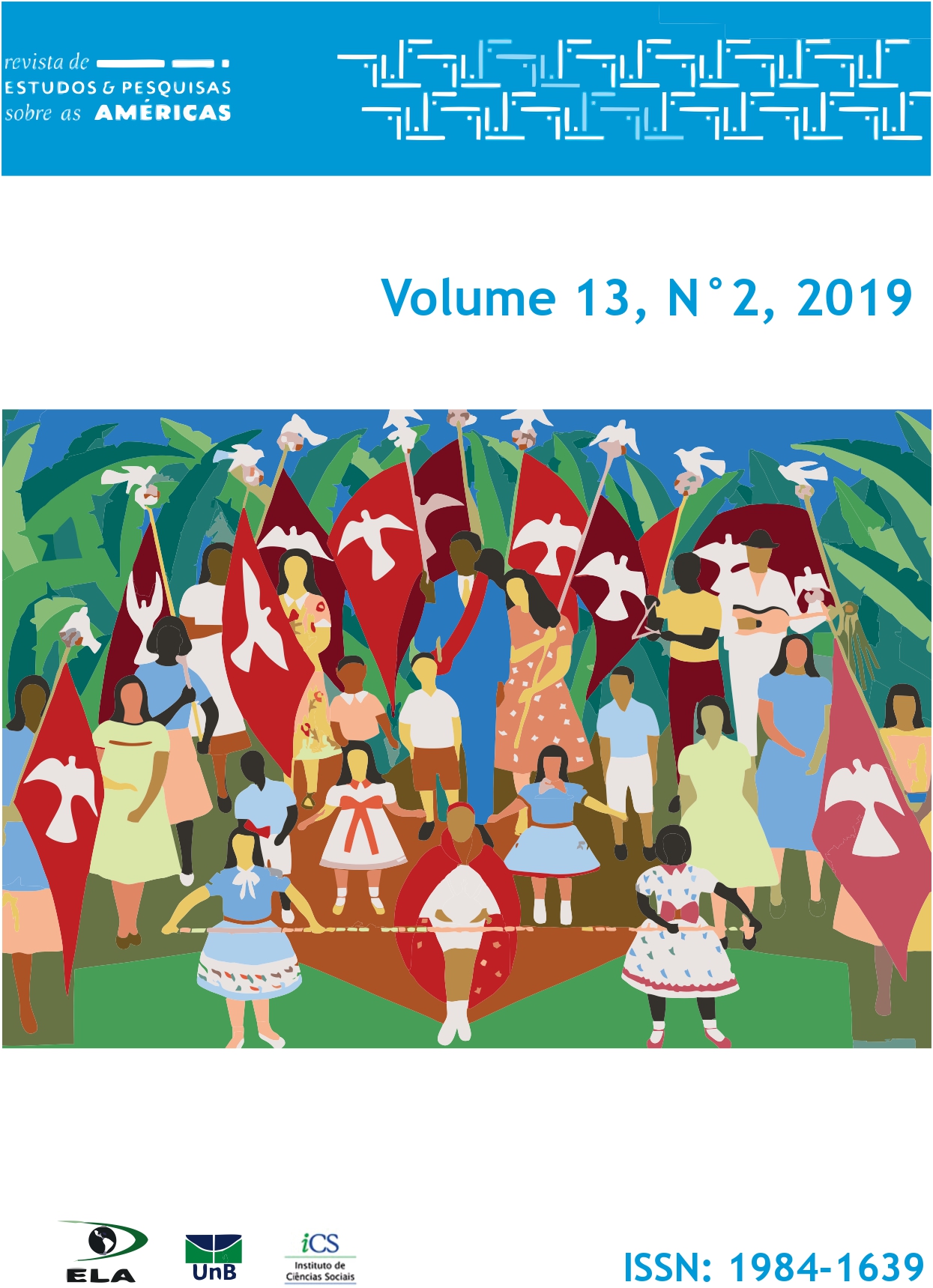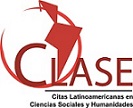Continuity and Variety of Neoliberalism: Reconsidering Latin America’s Pink Tide
DOI:
https://doi.org/10.21057/10.21057/repamv13n2.2019.23902Resumo
In this article we critically engage with the term and concept of “post-neoliberalism”, delineate different meanings in the literature and arrive at the conclusion that the term leaves more questions open than it answers. We therefore draw on literature that investigates the departure from (or persistence) of neoliberalism on a careful study of social power relations, i.e. Barry Cannon`s work on the rise of the right in Latin America. In taking his arguments further we present and examine transnational neoliberal think tank networks that are active in Latin America. We show the extent to which these networks have been developed across borders, investigate the key linkers within these networks are and situate the main currents within the contemporary constellation of right wing political ideologies. The article strengthens a relational perspective in the study of neoliberalism and its counter-forces and indicates research desiderata in the field of transnational ideological power structures.
Downloads
Referências
ABENDROTH, Wolfgang. Antagonistische Gesellschaft und politische Demokratie. Aufsätze zur politischen Soziologie. Neuwied ”“ Berlin, 1967.
ALENDA, Stéphanie, Andrea GARTENLAUB, and Karin FISCHER. “`Ganar la batalla de las ideas´: el rol de los think tanks en la reconfiguración de la centro-derecha chilena.” In: Alenda, Stéphanie (ed.). Las transformaciones de la derecha en Chile. Santiago: Fondo de Cultura Económica Chile, forthcoming 2019.
AMARAL, Marina. “The Right’s New Clothes.” http://www.brasilwire.com/the-rights-new-clothes/, English translation by Angela Milanese, June 2015.
ANDERSON, Perry. “Bolsonaro’s Brazil.” London Review of Books, vol. 41, n.3, p.11-22, 2019.
BAILEY, Norman A. “Organization and Operation of Neoliberalism in Latin America.” In: BAILEY, Norman A. (ed.). Latin America: Politics, Economics, and Hemispheric Security. New York/Washington/London: Frederick A. Praeger for The Center for Strategic Studies, pp. 193-238, 1965.
BECKER, Joachim (with support from Justyna Kajta, Adam Mrozowicki, László Neumann, Koen Smet). Neo-Nationalismus in der EU: Sozio-ökonomische Programmatik und Praxis. Wien: Materialien zu Wirtschaft und Gesellschaft Nr. 179, 2018
BORON, Atilio A. “El pos-neoliberalismo: un proyecto en construcción”. In: SADER, Emir and Pablo GENTILI (eds.). La trama del neoliberalismo. Mercado, crisis y exclusión social. CLACSO: Buenos Aires, 2003.
BRAND, Ulrich and SEKLER, Nicola. “Postneoliberalism: catch-all word or valuable analytical and political concept? Aims of a beginning debate.” Development dialogue, n. 51, p. 5-14, 2009.
CANNON, Barry. The Right in Latin America. Elite Power, Hegemony and the struggle for the State. London: Routledge, 2016.
CEDLA/Centro de Estudios para el Desarrollo Laboral y Agrario (ed.). Memoria del Seminario Internacional “Postneoliberalismo cambio o continuidad”. La Paz: CEDLA, 2009.
CHAFUEN, Alejandro. “Hope Amid Turmoil in Latin America?” Atlas Highlights, vol. 1, n. 6+7, 2006.
CHODOR, Tom. Neoliberal Hegemony and the Pink Tide in Latin America. Breaking up with TINA? Houndmills: Palgrave McMillan, 2015.
DJELIC, Marie Laure. “Building an architecture for political influence: Atlas and the transnational institutionalization of the neoliberal think tank.” In:
Christina GARSTEN and SÖRBOM, Adrienne (eds.), Power, Policy and Profit. Corporate Engagement in Politics and Governance. Cheltenham: Edward Elgar, pp. 25-44, 2017.
FÉLIZ, Mariano. “¿Neo-desarrollismo: más allá del neo-liberalismo? Desarrollo y crisis capitalista en Argentina desde los 90.” In: Revista Theomai, n. 23, pp. 72-86, 2011.
FISCHER, Karin. “The Influence of Neoliberals in Chile before, during, and after Pinochet.” In: MIROWSKI, Phil and PLEHWE, Dieter (eds.). The Road from Mont Pèlerin. The Making of the Neoliberal Thought Collective. Cambridge/London: Harvard University Press, pp. 305-346, 2009.
FISCHER, Karin. “The Atlas network: littering the world with free-market think tanks.” Global Dialogue, vol. 8, n. 2, pp. 10-11, 2018.
FISCHER, Karin and PLEHWE, Dieter. “Redes de think tanks e intelectuales de derecha en América Latina. Nueva Sociedad, n. 245, pp. 70-86, 2013.
FISCHER, Karin, and PLEHWE, Dieter. “Neoliberal Think Tank Networks in Latin America and Europe. Strategic Replication and Cross-National Organizing.” In: SALAS-PORRAS, Alejandra and MURRAY, Georgina (eds.). Think Tanks and Global Politics. Key Spaces in the Structure of Power.
Basingstoke: Palgrave Macmillan, pp. 159-186, 2017.
GOLDFRANK, Benjamin. “The Left and Participatory Democracy: Brazil, Uruguay, and Venezuela.” In: LEVITSKY, Steven and Kenneth M. Roberts (eds.): The Resurgence of the Latin American Left. Baltimore: Johns Hopkins University Press, pp. 162-183, 2011.
GRUGEL, Jean and Pia RIGGIROZZI. “Post-neoliberalism in Latin America: Rebuilding and Reclaiming the State after Crisis.” In: Development and Change, vol. 43, n. 1, pp. 1-21, 2012.
HARVEY, David. A Brief History of Neoliberalism. Oxford: Oxford University Press, 2005.
KALTWASSER, Cristóbal Rovira. “Towards Post-Neoliberalism in Latin America?” In: Latin American Research Review, vol. 46, n. 2, pp. 245-277, 2011.
KALTWASSER, Cristóbal Rovira. “La derecha en América Latina y su lucha contra la adversidad.” Nueva Sociedad, n. 254, pp. 34-45, 2014.
LÓPEZ SEGRERA, Francisco. América Latina: Crisis del Posneoliberalismo y Ascenso de la Nueva Derecha. Buenos Aires: CLACSO, 2016.
LUNA, Juan Pablo and KALTWASSER, Cristóbal Rovira. “The Right in Contemporary Latin America. A Framework for Analysis.” In: LUNA, Juan Pablo and Cristóbal Rovira KALTWASSER. The Resilience of the Latin American Right. Baltimore: Johns Hopkins University Press, pp.1-22, 2014.
LUNA, Juan Pablo and KALTWASSER, Cristóbal Rovira (eds.). The Resilience of the Latin American Right. Baltimore: John Hopkins University Press, 2014.
MANN, Michael. The Sources of Social Power, vol. I. A history of power from the beginning to AD 1760. Cambridge: Cambridge University Press, 1986.
MANN, Michael. The Sources of Social Power, vol. IV. Globalizations, 1945”“2011. Cambridge: Cambridge University Press, 2013.
MIROWSKI, Philip, and PLEHWE, Dieter (eds.). The Road from Mont Pèlerin. The Making of the Neoliberal Thought Collective. Cambridge, MA: Harvard University Press, 2009.
MITCHELL, Tim. “Property Rights against Poverty.” In: Mirowski, Philip/Plehwe, Dieter (eds.). The Road from Mont Pèlerin. The Making of the Neoliberal Thought Collective. Harvard University Press, 386-416; 2009.
MOREIRA, Constanza. “El largo ciclo del progresismo latinoamericano y su freno. Los Cambios Políticos en América Latina de la Última Década (2003-2015).” Revista Brasileira de Cièncias Sociais, vol. 32, n. 93, http://dx.doi.org/10.17666/329311/2017, 2017.
NUEVA SOCIEDAD. Los rostros de la derecha en América Latina (tema central), n.254, Noviembre-Deciembre, 2014.
ORTÚZAR, Pablo (ed.). Subsidiaridad. Más allá del Estado y del mercado. Santiago: IES, 2015.
PLEHWE, Dieter. “Introduction.” In: MIROWSKI, Philip, and PLEHWE, Dieter (eds.). The Road from Mont Pèlerin. The Making of the Neoliberal Thought Collective. Cambridge, MA: Harvard University Press, pp. 1-44, 2009.
PLEHWE, Dieter. “Transnational discourse coalitions and monetary policy: Argentina and the limited powers of the ‘Washington Consensus’”, Critical Policy Studies 5(02), pp. 127 ”“ 148, 2011.
PLEHWE, Dieter. “Think Tank Networks and the Knowledge-Interest Nexus. The Case of Climate Change.” Critical Policy Studies, 8 (1), 101-115, 2014.
PLEHWE, Dieter and Bernhard WALPEN, “Between network and complex organization: The Making of Neoliberal Knowledge and Hegemony,” In:
PLEHWE, Dieter, Bernhard WALPEN and Gisela NEUNHÖFFER (eds.). Neoliberal Hegemony: A Global Critique. London: Routledge, pp. 27-50, 2006.
PLEHWE, Dieter, WALPEN, Bernhard and NEUNHÖFFER, Gisela (eds.). Neoliberal Hegemony: A Global Critique. London: Routledge, 2006.
RAM, Rati. “Measuring economic freedom: a comparison of two major sources.” In: Applied Economics Letters, vol. 21, n. 12, pp. 852-856, 2014.
RAMÃREZ, Hernán. “The Brazilian neoliberal think tank network.” In: Global Dialogue, vol. 8, n. 2, pp.17-18, 2018.
ROMERO OCAMPO, Javier and BUSTAMANTE OLGUÃN, Fabián. “Neoliberalismo, poder y religión en Chile.” Revista de Investigación Crítica, vol. 3, n. 5, pp. 79-110, 2016.
RUCKERT, Arne, Laura MACDONALD and Kristina R. PROULX. “Postneoliberalism in Latin America: a conceptual review” In: Third World Quarterly, vol. 38, n. 7, pp. 1583-1602, 2017.
SADER, Emir. Refundar el Estado. Posneoliberalismo en América Latina. Buenos Aires: Instituto de Estudios y Formación de la CTA, 2008.
SADER, Emir. “Postneoliberalism in Latin America.” In: Development Dialogue, n. 51, pp. 171-179, 2009.
SLOBODIAN, Quinn. Globalists. The End of Empire and the Birth of Neoliberalism. Cambridge: Harvard University Press, 2018.
STANFORD, Jim. “Economic Freedom for the Rest of us.” Halifax: Canadian Autoworkers Union, www.csls.ca/events/cea1999/stanf.pdf, 1999.
STOLOWICZ, Beatriz. El Misterio del Posneoliberalismo. La estrategia para América Latina. Bogota: ILSA (Espacio crítico Ediciones), vol. 1 and 2, 2016.
TORNAGHI, Cecilia. “Pacific Alliance and Mercosur start plans free trade agreemtn.” In: Latin Finance July 24, 2018.
VELTMEYER, Henry and James PETRAS (eds). The New Extractivism: A Post-Neoliberal Development Model or Imperialism of the Twenty-First Century? London: Zed Books, 2014.
VOMMARO, Gabriel. “‘Meterse en política’: la construcción de PRO y la renovación de la centroderecha argentina. In: Nueva Sociedad, n. 254, pp. 57-72, 2014.
Downloads
Publicado
Como Citar
Edição
Seção
Licença
a. Autores mantém os direitos autorais e concedem à revista o direito de primeira publicação, com o trabalho simultaneamente licenciado sob a Licença Creative Commons Attribution que permite o compartilhamento do trabalho com reconhecimento da autoria e publicação inicial nesta revista.
b. Autores têm autorização para assumir contratos adicionais separadamente, para distribuição não-exclusiva da versão do trabalho publicada nesta revista (ex.: publicar em repositório institucional ou como capítulo de livro), com reconhecimento de autoria e publicação inicial nesta revista.
c. Autores têm permissão e são estimulados a publicar e distribuir seu trabalho online (ex.: em repositórios institucionais ou na sua página pessoal) visando aumentar o impacto e a citação do trabalho publicado (Veja O Efeito do Acesso Livre).
d. Ao ter seu trabalho aprovado e publicado, o autor compromete-se a colaborar com os processos de avaliação de outros trabalhos, em conformidade com sua disponibilidade e área de atuação.
















